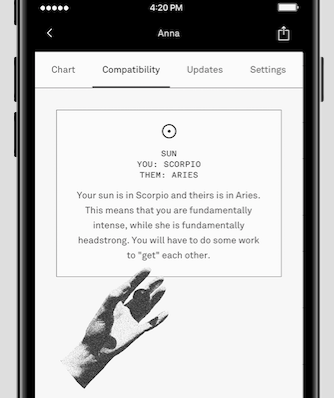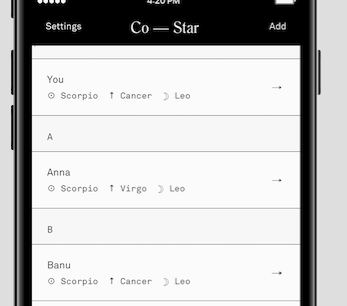This AI Can Write Your Horoscope
Credit to Author: Emma Paling| Date: Tue, 31 Oct 2017 19:09:44 +0000
Two Scorpios and a Pisces had an idea.
Typical horoscopes, written to a person’s Sun sign and found in the margins of magazines, can be too broad for the astrology-obsessed, the three friends thought. And employing a personal astrologer is too expensive.
So Banu Guler, Ben Weitzman, and Anna Kopp decided to take it to the next level. They spent months studying the art of astrology, and then fed their findings into an AI program they created. They launched the resulting app, Co—Star, on October 11.
“Everyone we know is obsessed with astrology,” Guler, who designed the app, told Motherboard in an interview. Weitzman and Kopp are developers, and all three previously worked at VFILES, a fashion site in New York City.
“Everyone looks at their Broadly horoscopes [editor’s note: Broadly is a VICE site] and their Susan Miller horoscopes, looks up their natal charts on these outdated sites from the ’90s, and knows when Mercury is in retrograde. But there wasn’t really an app that comes at astrology the way everyone we know has been talking about it.”

Typical horoscopes are written to a person’s Sun sign, which is only one part of their astrological chart. The Moon, the other planets in the solar system, and the 12 Houses of the Zodiac—each represents a different part of life, like relationships, work, and home—also influence the predictions.
Co—Star’s creators say the app, and its algorithm, takes into account all these factors. Users enter their time, date, and place of birth so the app has their complete birth chart. The app’s engine then pulls in data from NASA to track planets as they move. Then, Co—Star generates a daily horoscope about how the latest movements, called transits, affect a user based on their birth chart. Friends can add each other, compare charts, and see their compatibility.
“Taking all of this ancient art of astrology and figuring out how to translate it into a computational model has been a really interesting challenge,” Weitzman said.
The app’s engine pulls in data from NASA to track planets
The trio spent months looking through textbooks on astrology, and talked to professional astrologers about how they interpret different celestial events. “We ended up having to find a lot of paper books, which was a funny thing to have to translate into algorithms,” Guler said.
They created an engine that generates natural language horoscopes based on the significance of certain transits. First, it calculates numerical data from transits. “We then assign astrological meanings to the different relationships in this data and our program generates text based on those meanings,” Guler said.
She said their horoscopes are “unprecedented” because of the amount of detail their engine takes into account. Apps that write horoscopes for transits, but don’t consider which house the transit affects, won’t be as accurate, Guler said.
A transit, like Jupiter moving into Scorpio, has an astrological meaning. But this meaning affects different people in different ways depending on which house it falls into in their chart. So if Jupiter falls in someone’s First House of Self, that transit would affect them differently than it does their friend, who has Jupiter in their Fourth House of Home.
“This detail allows us to deliver far more personalized horoscopes. Without the houses, it’s impossible to know the precise domains of life affected by a particular transit,” Guler said.
I called Broadly’s in-house astrologer Annabel Gat, who said she isn’t sold. A computer can write a horoscope just fine, she said, but the program should be written by professional astrologers, not developers. “Most of the astrologers who do daily readings and give these reports have been doing it for more than 10 years,” she said. But an app made by hobbyists might end up “pulling something out of its electronic ass.”

“There’s already other things on the market that would give a better automated horoscope,” she said, suggesting The Daily Hunch or TimePassages.
An engine might skimp on one of the fundamental aspects of astrology, Gat added. And algorithms are, of course, still prone to human bias. Plus, AI could take us away from astrology’s roots. “What’s fun about astrology is that it’s a form of storytelling. It’s based on mythology and part of what makes it fun is the human element.”
But Co—Star’s creators say they aren’t trying to replace human astrologers, just add something new into the mix.
“There is a huge gap between the infinite chaos and beautiful complexity of a human mind and a robot,” Guler noted. “We’re instead hoping to occupy a position between having personal astrologers and mass media horoscopes.”
Get six of our favorite Motherboard stories every day by signing up for our newsletter .